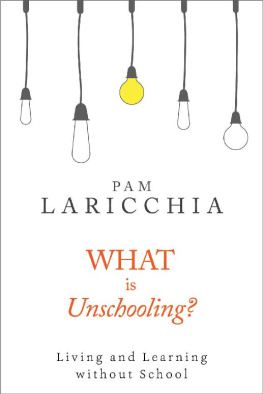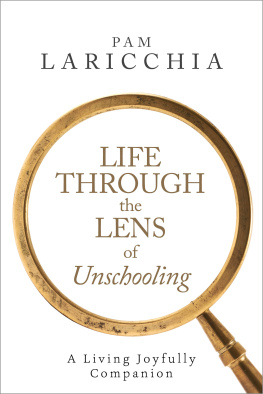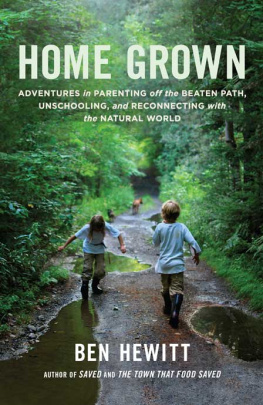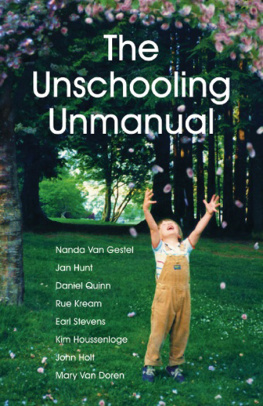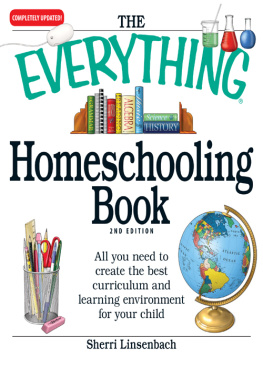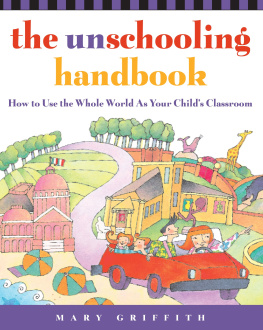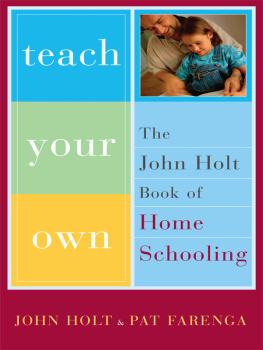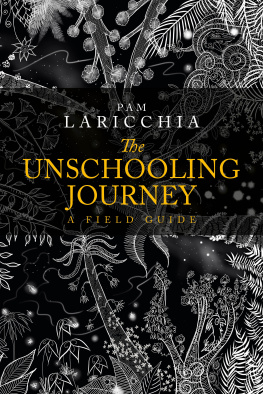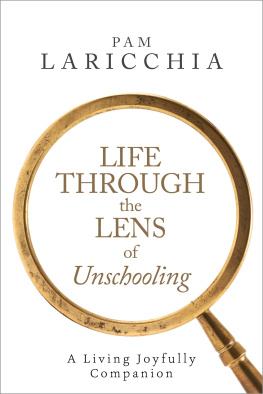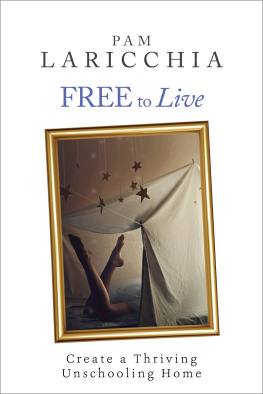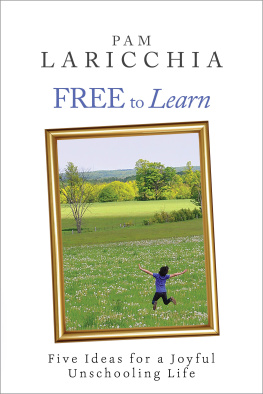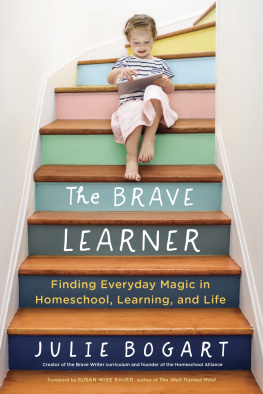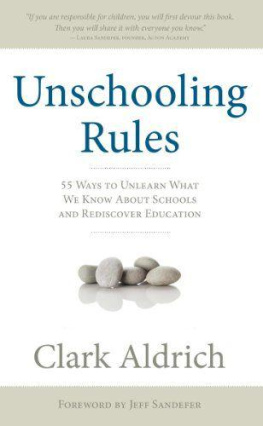Contents
What is
Unschooling?
PAM LARICCHIA
Copyright 2016 Pam Laricchia
All rights reserved.
Published by
Living Joyfully Enterprises
Erin, Ontario, Canada
ISBN-13: 978-0-9940555-2-1
Cover design by Jane Dixon-Smith
Introduction
Hi, my name is Pam Laricchia and Im the creator of Living Joyfully , a website all about unschooling. I live in Ontario, Canada, and we began unschooling in 2002, when my children were nine, seven, and four. They are now all over eighteen and beyond the compulsory school age here so we can officially call it living, even though thats really what weve been doing since they left school all those years ago.
I put together this introductory book about unschooling because I still remember those first months, reading anything and everything I could find online about unschooling. I began questioning so many of my basic assumptions about learning and living, and recall the empowering, yet disorienting, feeling of information overload. And that was back in 2002! There's even more information (and misinformation) to sift through now.
Looking back, it's now more apparent to me which ideas and bits of information ended up being most helpful on our unschooling journey, and it's those I will focus on sharing with you.
How Do You Learn Things?
Let's first take a moment together to explore how you like to learn new things. That may seem like a trivial place to start, but I promise it will be so helpful in setting you up to get the most out of this book!
How do you first dive into a topic you want to know more about? I usually start with a web search and begin reading the websites and articles that catch my eye. Im likely to check out a few related podcasts or YouTube channels, and buy a book or two. At first I don't really have a clue if the information Im gathering is particularly useful, or even true. But soon I begin to notice different people sharing similar information. That information begins to rise to the top as more credible, while things I read or heard once and are never mentioned again start to sink to the bottom.
All this information swirls around in my mind as I go about my days. Our subconscious does some amazing sorting and connecting. The stuff that makes sense to me begins to rise to the top, while I discard that which so obviously doesn't align with my own experience. I start to develop a level of trust in some sources and dig deeper into the information they provide. And I keep my eyes open for more sources. Magazines? Online forums? Local groups? Friends I can connect with? Again the good stuff rises, the rest falls away. I'm learning.
What does your learning process look like?
Now let's look specifically at learning about unschooling. As someone new to the topic, reading about what experienced unschoolers are up to can be incredibly inspiringand also a bit scary. I remember when I first began reading unschooling forums. I was so sure I had an open mind, but I remember thinking, "Well, we won't ever be doing that." More than once. Yet as I learned more and more about the principles of unschooling, about the ideas behind the actions that had at first seemed so irrational, they began to make sense to me. And surprise! I was doing many of those things a few months down the road. Its a pretty fascinating journey.
With this book, I hope to help you
- navigate the sea of unschooling information out there;
- understand the principles and basic concepts first, so that you have a strong foundation to build upon; and
- avoid the chaos that can happen when families jump into unschooling without understanding how it works.
And heres a tip. Don't do things that don't make sense to you. That's just an invitation to disaster for everyone. Instead, take the time to learn more about unschooling, to discover the wonderful people that your children are, and in a few months you too may find yourself joyfully doing things with your family that right now may seem unthinkable.
Work Your Learning Process
Learning about unschooling is really exciting! It challenges you to think for yourself, yet rewards you deeply. Taking the time to understand how you learn will also help you recognize the ways your children are learning outside the classroom. (Hint: Your childrens process may be different from yours.) It may look very different, but I'm sure you will love seeing your family living and learning in ways you probably have yet to imagine.
As you go through this book, take the time to make connections between the information I'm sharing and your day-to-day lives. Do the ideas make sense? Not with the conventional messages you're probably bombarded with every day, but with your own life experience? With your experiences in school? And your childrens, if theyve been? How about with your experiences living and learning on your own? And those of other people you know?
What Are Your Goals?
What has spurred you to learn about unschooling? Your own unhappy school experience? Or your children's? Or are you philosophically exploring alternatives to the conventional treadmill of high school, college, and nine-to-five job? Understanding your motivation will help you determine your goals, and help you articulate them in conversation with others.
Whichever direction you are coming from, just the fact that you're interested in learning more about unschooling tells me that you are the kind of person that doesn't take societal expectations as truth. Instead, you want to understand the why behind these expectations to see if they align with your own personal experience. Are they true for you? Are they applicable to your life today? Do they fit with the person and parent you want to be?
What are your goals for learning about unschooling? Are you looking to cultivate the joy of learning for your children? Are you looking to spend more time with them? Are you looking to develop strong and connected relationships in your family? Unschooling will support all those goals, and more. But knowing which goals you're looking to meet, at least for now, will help you filter through the information and home in on that which directly supports them.
If you have a philosophical bent, you may enjoy reading Sandra Dodd's short online article: Rejecting a Pre-Packaged Life .
It's a little primer for the places we can go.
Man's mind, once stretched by a new idea, never regains its original dimensions.
~ Oliver Wendell Holmes Jr.
What is Unschooling?
Unschooling is just a kind of homeschooling. In fact, while weve been unschooling for many years, I dont often use the term in passing conversationsI just say were homeschooling. Theres a better chance people will have at least heard of homeschooling. And if they are actually curious, theyll ask more questions and the conversation will eventually get around to unschooling.
The Term Unschooling
The term unschooling was first coined by John Holt back in the 1970s. Holt was a teacher, working to change the school system from the inside. Once he felt that wasn't going to work, he began advocating for parents to take their kids out of school altogether. It was around the time when 7-Up was marketing itself as the UNcola (to distinguish itself from Coke and Pepsi).
How could he differentiate this way of educating kids from the typical path of school? UNschooling! And it stuck.
One of the first questions people often have when they come across unschooling is, "What IS unschooling?" Such a seemingly innocent question, but it can be a challenge to answer, let alone to do so concisely. That's why sound bites about unschooling for TV interviews often fail so miserably. Even newspaper articles have a hard time getting the point across. Most writers were assigned the story with a short deadlinethey are doing their best, but it's hard to understand unschooling deeply enough to explain it to others in that short a time frame.

